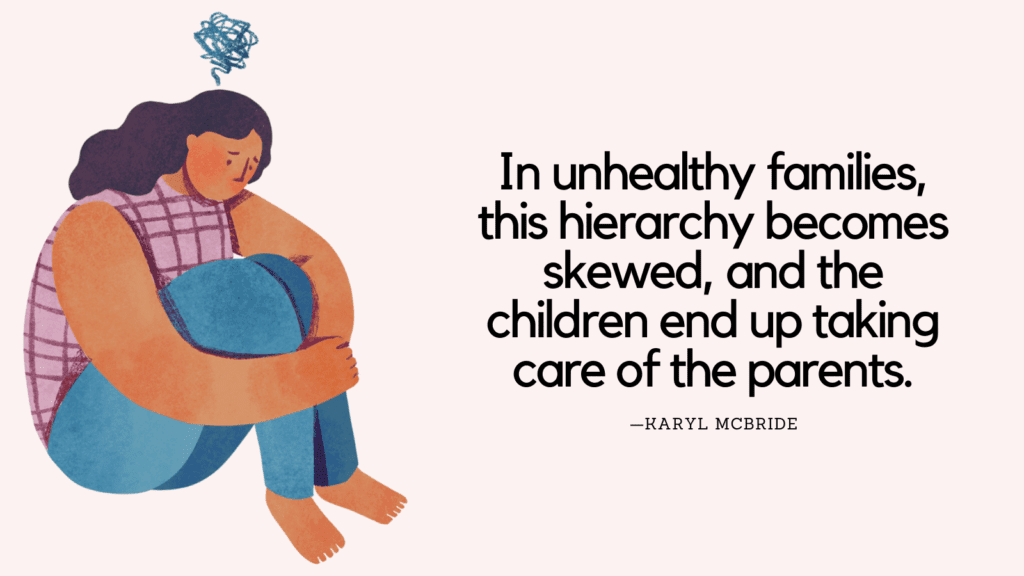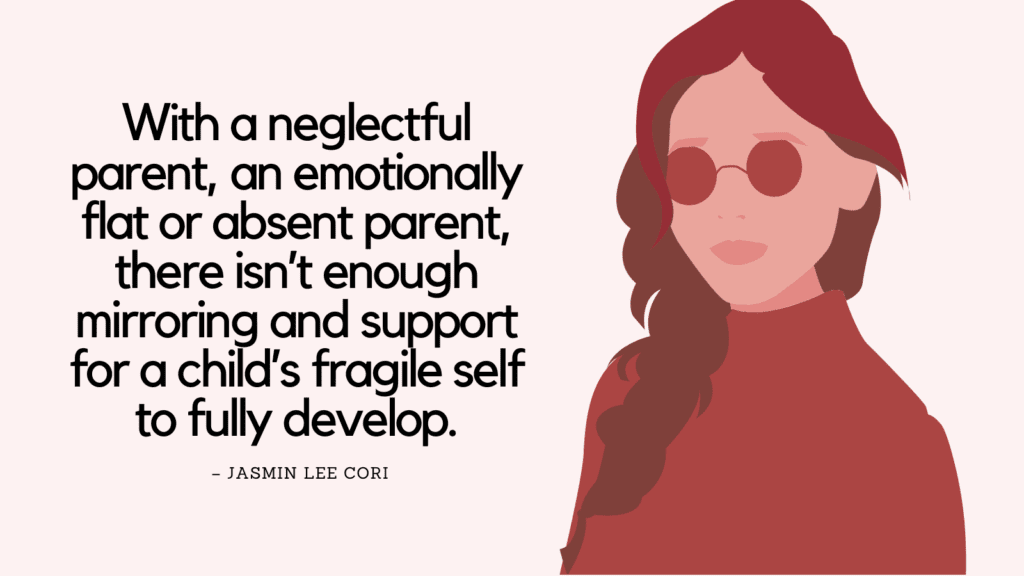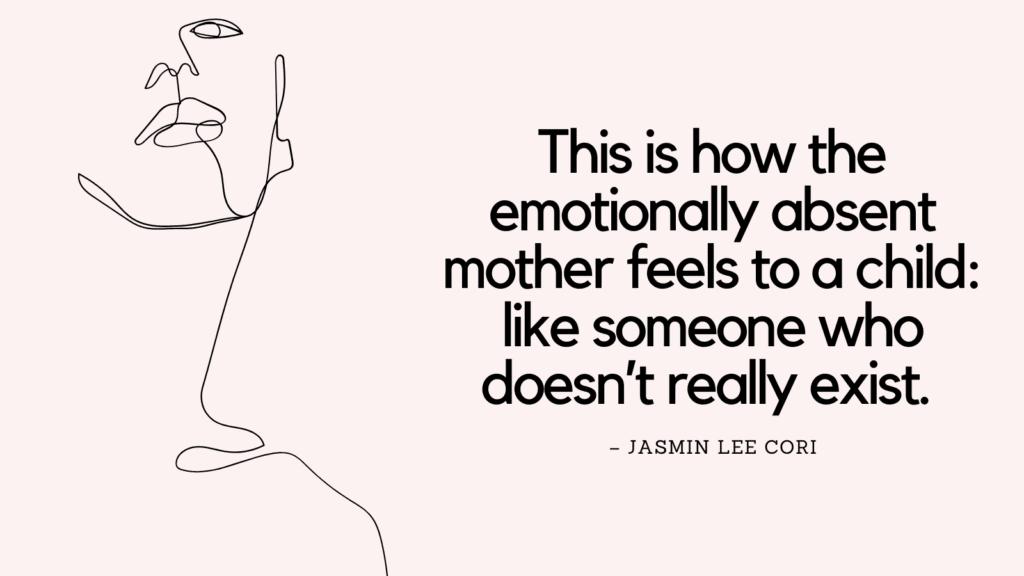This post contains some of the best bad parents quotes.
Bad Parents Quotes
1. “Are you miserable when you are around your parent? Are you still longing for your parent’s love and approval even as an adult? If your answer to many of these questions is yes, then you may have grown up with a parent whose behaviors and attitudes were symptomatic of being self-absorbed.”— Nina W. Brown
2. “Narcissistic parents involve their children prematurely in the adult world. A narcissistic mother who constantly confides in her daughter about difficulties in her relationship with her husband, for example, does not understand how painful this can be for her child.”— Karyl McBride
3. “In severe cases of maternal narcissism, where neglect or abuse is involved, the most basic level of parental care is missing.”—Karyl McBride
4. “True to their legacy of distorted love, which has been carried over from generation to generation, most narcissistic mothers either severely over-parent (the engulfing mother) or severely under-parent (the ignoring mother).”—Karyl McBride
5. “As we grow through each stage of development, when our parents nurture and love us, we grow up feeling secure—our emotional needs are being met. But when a daughter does not receive this nurturing, she grows up lacking emotional confidence and security, and must figure out a way to gain these by herself—not an easy task when she doesn’t know why she always feels empty to begin with.”— Karyl McBride
6. “Showbiz moms are a classic example of engulfing mothers, the ones who shepherd their daughters through child beauty pageants or TV shows like Showbiz Moms & Dads. The ad for this show in a popular magazine contains the line “Some parents want fame so badly” next to a picture of a mother pushing her little princess onto the stage.”—Karyl McBride
7. “One of the most troubling and enduring effects of reverse parenting can be heightened emotional susceptibility. Emotional susceptibility is the tendency to “catch” others’ feelings (usually negative feelings), incorporate these feelings into your self, and then find that you are unable to easily release them.”—Nina W. Brown
Related: Healing From A Narcissistic Abuse By A Parent – 7 Practical Strategies
8. “Mothers who ignore or under-parent their daughters do not provide guidance, emotional support, or empathy. They consistently discount and deny your emotions.”—Karyl McBride
9. “Divorce also sometimes leads one parent to turn a child against the other parent so he or she can have his way in the custody battle. This is a classic example of emotional child abuse that hurts the child much more than these alienating parents realize.”—Karyl McBride
10. “The needy self-absorbed parent can come across to others as very caring and concerned. This parent is usually attentive, tries to anticipate every need, and is very anxious about getting recognition for their efforts. This need for recognition, specifically, is very suggestive of selfabsorption. This parent has to receive attention, appreciation, and approval for almost every parental act, both from the child and from others.”—Nina W. Brown
11. “Prickly self-absorbed parents are very demanding and expect prompt and accurate compliance with their needs, whether or not these needs have been verbally conveyed. Others are expected to “do the right thing,” to always “do it right,” without ever receiving an adequate explanation of what “right” means for the parent. This parent can also be very touchy, sensing disapproval, criticism, and blame from almost everything that is said and done, whether or not that is what was actually meant. As a consequence, the child is always tense around this type of parent, careful in what they say and do, and continues to try to “get it right” or to withdraw physically or emotionally.”—Nina W. Brown
12. “Conniving self-absorbed parents are always positioning themselves to win, to come out on top, to be superior to others, and to make sure that all others understand that they are inferior. This applies to almost all aspects of their life, including their children. Such parents will lie, cheat, distort, and mislead in order to achieve their goals. Others are considered fair game for manipulation and exploitation, including their children. Such parents can be adept at reading others’ needs and emotional susceptibilities and using this knowledge to manipulate and exploit others. Some effects on their children when they become adults are a wariness and constant questioning of others’ motives or a tendency to get into relationships where they are manipulated to do things they do not want to do or that aren’t in their best interest.”—Nina W. Brown
Related: How To Set Boundaries With Narcissistic Parents?
13. “The grandstanding parent can be described as “always on stage,” “playing to the crowd,” and “larger than life.” Others in this parent’s world have to assume a subordinate role, and that role must support and highlight the parent’s self-perception. This parent’s children are perceived as extensions of the parent, and the children exist to enhance and expand the areas where the parent can be admired, receive attention, be better than others, and so on. The child must never fail; and when the child succeeds, that success is perceived as due to the parent’s efforts or contributions. The effects on these children can produce someone who is timid, cautious, and always seeking attention and admiration, or someone who acts out to get the same outcomes as does the parent.”—Nina W. Brown
14. “The daughter needs to be allowed to depend on both her parents, but when a mother shares adult concerns with her daughter, a healthy dependence becomes impossible; the daughter feels insecure and alone because she has no parent on whom she can depend.”—Karyl McBride
15. “The parent with a substance-abuse problem will always seem narcissistic, because the addiction speaks louder than anything else. Sometimes when an abuser sobers up, the narcissistic behavior goes away. Sometimes not.”—Karyl McBride
16. “Self-absorbed parents are unlikely to change because they see no reason to change. They think they are “right” in their perceptions, behaviors, and attitudes and that you are “wrong” if you differ or challenge them. It’s been that way all of your life, but you just keep hoping, wishing, and yearning for them to change and that hasn’t happened. You cannot make it happen, and the time you spend fantasizing about that, even when you think those times are few, takes away time that you could be using for more constructive thoughts and plans.”—Nina W. Brown
17. “The family with a narcissistic mother operates according to an unspoken set of rules. Children learn to live with those rules, but they never stop being confused and pained by them, for these rules block children’s emotional access to their parents.”—Karyl McBride
18. “There are two categories of responses the children of self-absorbed parents can employ to try and protect themselves from the more destructive aspects of their parent: compliance and rebellion.”—Nina W. Brown
Related: Toxic Mother Daughter Relationship Quiz (+FREE Worksheets)
19. “Some parental actions and messages that happened early in the child’s life can still be affecting the child as an adult. These actions and messages were powerful, incorporated by the child without the child knowing or realizing what was happening. They became a part of the child’s selfesteem, and are still exerting effects on the child as an adult, some of which may be unconscious. The negative effects of these parental actions and messages produced deep hurts during childhood, and those wounds have not yet healed.”—Nina W. Brown
20. “Tragically, parental denial is what keeps the family together for better or worse, and many families do choose not to confront their problems even though they hurt their children.”—Karyl McBride
21. “Narcissistic families are disconnected emotionally. They may appear solid on the exterior, but authentic communication and connections between the members rarely take place because the parents in this family are focused on themselves. They expect the children to react to their needs, instead of the other way around, as in a healthy family. In this dysfunctional system, adults do not deal with real feelings, and therefore do not meet the emotional needs of the children.”—Karyl McBride
22. “Were you responsible for the physical or emotional well-being of your parent or parent figure, or even both parents? This is called parentification, where instead of the self-absorbed parent taking care of the child’s well-being, the child is expected to assume responsibility for the parent’s well-being, especially that parent’s emotional well-being.”—Karyl McBride
23. “Your parent’s responses to you, their conscious and unconscious messages to you about your essential inner self, and your personality and responses to your parent—all these interacted to produce the injuries and lack of development you are probably dealing with today.”—Nina W. Brown
24. “Self-absorbed parents may not be aware of or care about the impact of their behaviors and attitudes on others, but there are times when they think that it is in their best interests to act as if they are aware and care.”—Nina W. Brown
25. “Difficult interactions with your self-absorbed parent can trigger your negative feelings such as anger, guilt, and shame. It would not be unusual for your responses to be ineffective because you are trying to protect your essential inner self while trying to think of an appropriate response.”—Nina W. Brown
Related: Is My Mother A Narcissist Quiz
26. “Lack of empathy from a parent or caretaker, neglect, blame, criticism, failure to accept you as you are and appreciate your qualities, and other such experiences could have shaped your belief that others’ needs should be placed above your own. It will be difficult for you to overcome this belief and achieve a satisfactory balance between appropriate self-care and the need to take care of others.”—Nina W. Brown
27. “Some of your unrealistic expectations for yourself result from the messages received from your self-absorbed parent about how you were expected to take care of the parent.”—Nina W. Brown
28. “Old parental messages about you contribute to your self-blame, feeling shame and guilt, and other negative thoughts and feelings about yourself.”—Nina W. Brown
29. “Being around your self-absorbed parent can trigger your old childhood feelings, such as helplessness, fear, or inadequacy. Although you are now an adult and react differently with other people, you may be unable to do so when you are in the presence of your parent, or even on the phone.”—Nina W. Brown
30. “Self-absorbed parents may present themselves differently to different people and in different situations or environments. In addition, other people have their own unique lens for perceiving and reacting to others. Depending on their roles and connections to your self-absorbed parent, other people may not see beyond the façade presented, and they may not realize that the parent acts and relates differently to you or others.”—Nina W. Brown
Related: Is My Mother-In-Law A Narcissist Quiz




